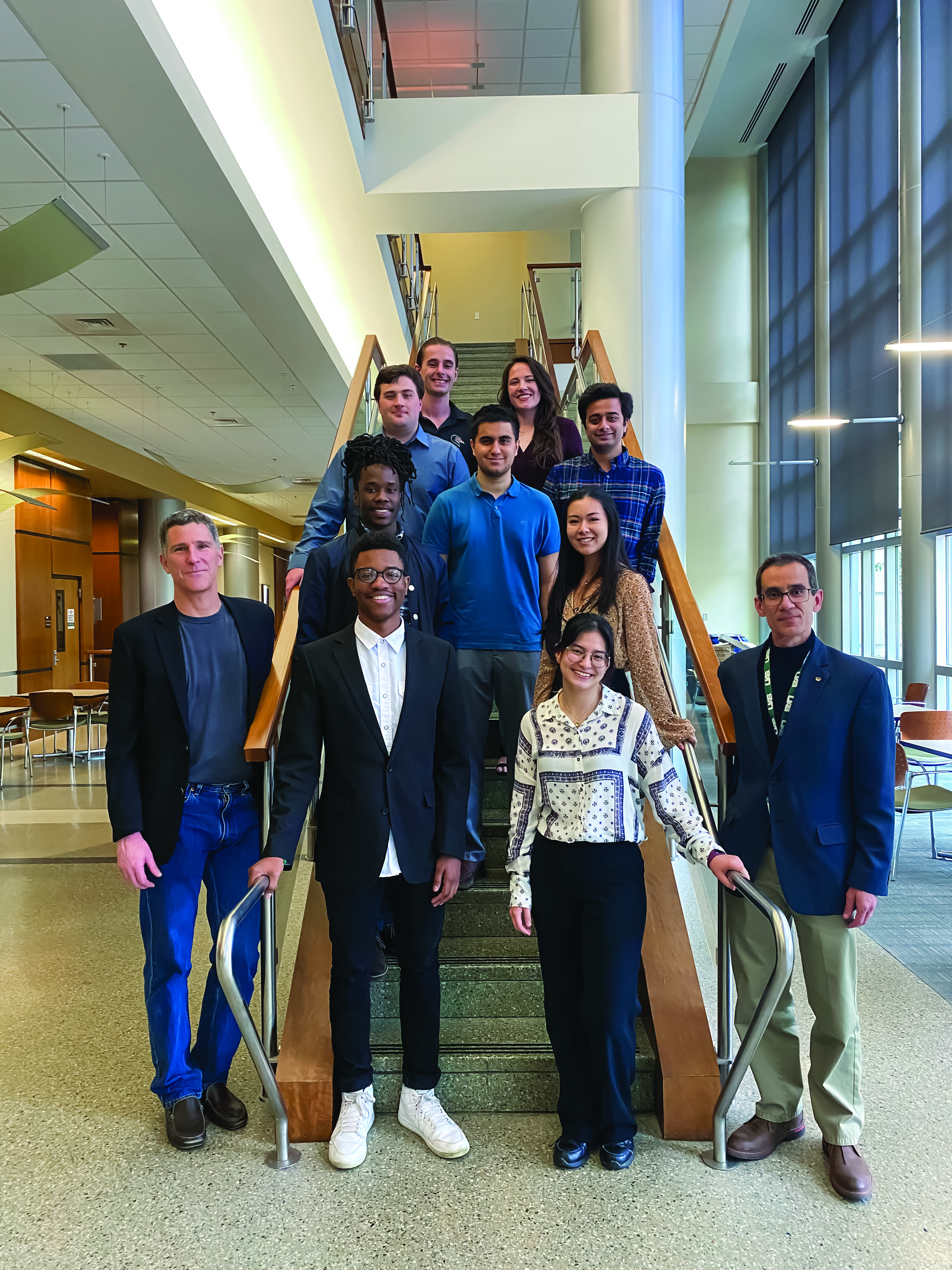The Value of an Honor Society
Winter
2023
Special Feature
The Value of an Honor Society
Blane Baker, Sigma Pi Sigma President and Professor of Physics, William Jewell College
As president of Sigma Pi Sigma, I am often asked, “What is the difference between the Society of Physics Students and Sigma Pi Sigma?” To put it briefly, SPS is a professional society open to all students interested in physics and astronomy, and Sigma Pi Sigma is the physics and astronomy honor society and recognizes outstanding academic performance or distinguished service.
As I have interacted with folks over my first few months as president, some have questioned the value of honor societies, which are exclusive by their very nature. I would like to offer two responses, but first I will start with some history.
Sigma Pi Sigma originated on the campus of Davidson College in 1921. In December of that year, five undergraduate physics students and four faculty members established an organization for physics students that emphasized honoring scholarship, encouraging interest in physics, promoting service, and providing fellowship. They called their organization Sigma Pi Sigma. This name comes from the first letters of a motto that translates from the Greek as “Investigation, the forerunner of knowledge.”
Once ΣΠΣ was established at Davidson, physics departments throughout the country expressed interest in the organization. A chapter at Penn State was founded in 1926 by Marsh White, who served as Sigma Pi Sigma executive secretary for more than 20 years. You may be familiar with his name―in honor of White’s longtime service, SPS offers Marsh W. White Awards to support chapter projects designed to promote interest in physics among students and the public.
The first national convention of ΣΠΣ was held at Davidson College in 1928, with the six existing chapters participating. That convention was the precursor to the modern Physics Congress, including the most recent congress held in October in Washington, DC. By 1929 there were ten ΣΠΣ chapters.
In the early days, Sigma Pi Sigma was a fraternal organization complete with secret handshakes and shenanigans. At the first business meeting of the organization at Davidson, the most serious discussion focused on how much voltage could be applied to a new member without causing “permanent damage.” Apparently, the experiment was done on “Wooly” Grey, a member of the first induction class, with no harm done.
At the third national convention at Purdue in 1934, the name “fraternity” was replaced by “society,” and all secrecy was removed. In 1936, ΣΠΣ became—and remains to this day—an Associated Society in the Physics Section of the American Association for the Advancement of Science (AAAS). In 1945, ΣΠΣ became a member of the Association of College Honor Societies (ACHS), the national accrediting organization. In the early 1950s ΣΠΣ became an Affiliate Member of the AAAS.
Also in the 1950s, the American Institute of Physics (AIP) and Sigma Pi Sigma began collaborating on projects centered around physics education and student development. On April 22, 1968, Articles of Agreement between the AIP Student Sections and ΣΠΣ were signed, resulting in two joined organizations, the Society of Physics Students (SPS) and ΣΠΣ. Both societies remain supported by AIP today. The two organizations operate side by side in many departments, cohosting events and outreach programs.
SPS welcomes all students interested in physics and astronomy. Today there are over 800 SPS chapters at colleges and universities worldwide, and members are typically undergraduate students. There are fewer Sigma Pi Sigma chapters, but membership in Sigma Pi Sigma is for a lifetime. Students who excel in their academic programs or demonstrate exemplary service may be invited to join by their local chapter. Alumni may also be inducted. The honor society fosters opportunities for its 100,000 members—ranging from students to those who’ve been long retired—to connect and contribute to the broader physics and astronomy community. This includes supporting current undergraduate students through giving and other means.
SpecialFeature-3.jpg

Continuing the tradition started in 1928, the 2022 Physics Congress brought together 1,200 physics undergraduates and mentors to build community, share research, and discuss the future of physics and astronomy. Many of these students would have been unable to attend without the generous financial support of Sigma Pi Sigma members.
So, what is the value of an honor society?
First, I believe that Sigma Pi Sigma and other honor societies can, and should, use their resources to give all students opportunities to thrive. Honor societies can provide scholarships, sponsor outreach programs for kids, and fund research opportunities for departments with no budgets for scholarly work. Sigma Pi Sigma is engaged in these activities, and I would like to see us do even more. As organizations that value fellowship and service, one of our highest priorities must be to promote inclusivity and advocate for everyone.
Second, while societies like Sigma Pi Sigma honor certain achievements, those individuals who are inducted are charged with promoting physics and astronomy for the good of all. That’s something I encourage members to take seriously. By promoting our values of fellowship, service, and appreciation for the field, honor society members can help everyone around them to thrive. As I have often told my students, use your sphere of influence to make the world better for everyone.
As your SPS chapter engages in departmental, campus-wide, community, and zone activities, I invite you to consider organizing a Sigma Pi Sigma induction ceremony to honor students who have achieved academically in your department, or who have served SPS during their undergraduate careers. If your school doesn’t already have a chapter of Sigma Pi Sigma, reach out to the SPS National Office for guidance on starting one.
Sigma Pi Sigma induction ceremonies provide opportunities to connect with alumni, host guest speakers, and introduce new students to your department. In my department at William Jewell College, we conduct an annual induction ceremony and then gather for a social and dessert, followed by various departmental recognitions. Everyone is included, and students often remember this event as a special time in their undergraduate experience.
From its inception, Sigma Pi Sigma has sought to help all students thrive and to serve the public by sharing our passion for physics and astronomy. Today we continue that legacy with a renewed commitment to providing opportunities for all students and ensuring that all are welcome.
For more information on Sigma
Pi Sigma and hosting an induction,
visit sigmapisigma.org.



